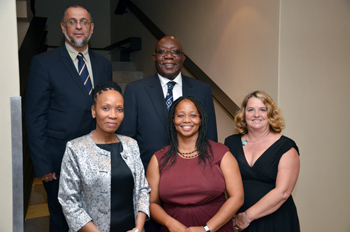Latest News Archive
Please select Category, Year, and then Month to display items
03 October 2018
|
Story UFS
|
Photo Katlego Sekele
 Students engaged authorities and Student Affairs
representatives on sexual and gender-based matters.
Students engaged authorities and Student Affairs
representatives on sexual and gender-based matters.
Do you know enough about the Sexual Harassment, Sexual Misconduct and Sexual Violence policy adopted by the university in June 2018? The Office for Gender and Sexual Equity (GSE) at the University of the Free State (UFS) hosted a dialogue on the role of the institution in matters of sexual and gender-based violence and addressing issues surrounding sexual violations.
Developments such as the countrywide #TotalShutdown: Intersectional Women’s March Against Gender-based Violence last month serve as proof of the dire need for issues surrounding sexual violations to inform policies and active safety measures.
Policy purpose
According to the policy, the objectives are to create a safe and enabling environment, establish a common understanding of what constitutes sexual harassment, sexual misconduct and sexual violence, provide applicable and accurate information, ensure that victims receive the necessary support, clearly outline disciplinary procedures for perpetrators, and clarify institutional accountability.
Student’s take on solutions
Tammy Fray, a member of the Student Representative Council, who formed part of the panel at the discussion, says the policy is not a one-stop-shop solution. “The policy is a guiding document. We have to then use it to inform activist work. We cannot always put the onus on policies and codes of conducts to solve problems. However it is our responsibility within this academic space to come up with solutions that enhance the way the policy works.”
Be informed about the policy
It is important to understand the stipulations of the policy in order to make full use of it. Geraldine Lengau, Officer at the GSE said: “It’s important that students know that the institution is not operating in silos but that their demands have been heard and the institution has acknowledged that there is a need for the policy to be adopted. It also makes the process of reporting better with the assistance of the Sexual Assault Response Team coordinator.”
Twenty years of human rights - a call for reflection on the successes and challenges
2015-02-25

Back from the left are: Advocate Mohamed Shafie Ameermia, Commissioner, South African Human Rights Commission Advocate Lawrence Mushwana, Chairperson of the South African Human Rights Commission Front from the left are: Honourable Mahube Molemela, Judge President of the Free State High court and Acting judge of the Constitutional Court of South Dr Choice Makhetha, Vice-Rector External Relations, University of the Free State Prof Caroline Nicholson, Dean of the Faculty of Law, University of the Free State |
The South African Human Rights Commission (SAHRC), the Faculty of Law, and the Free State Department of Education hosted a gala dinner on 19 February 2015 to celebrate the launching of the Free State Provincial Division of the SAHRC, reaffirming their collaborative partnership, and confirming the commitment of the Free State Department of Education to community engagement, constitutional rights awareness, and youth advocacy.
The number of human rights abuses reported to the Human Rights Commission in recent years points to the complex nature of the challenges faced by South African communities. What is most disturbing is that the overwhelming majority of these offences are perpetrated by the youth, said Adv Lawrence Moshwana, Chairperson of the South African Human Rights Commission. “The Human Rights Commission is in need of support from government in order to be able to reach all provinces of South Africa”. The expansion of the commission’s services in the Free State and its partnership with the Provincial Department of Education is a great step towards protecting the rights of the most vulnerable communities.
Twenty years of human rights (read the full story)